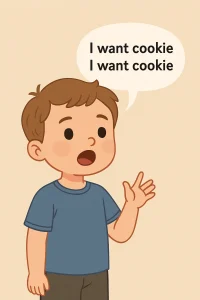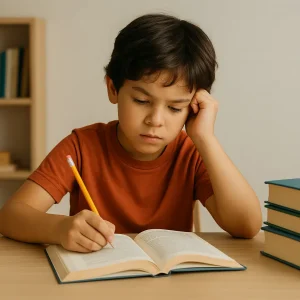What Age Should a Child Answer WH Questions?
By Rajini D
Last Updated: February 17, 2025
Ever wondered about the age kids answer WH questions like “What’s this?” or “Where is it?” These WH questions are key milestones in language development, showing how your child understands and interacts with the world. Knowing when to expect these skills can help you support their growth effectively. In this guide, we’ll explore the typical age kids answer WH questions and simple ways to encourage your child’s communication skills. Let’s dive in and see how you can make learning fun and natural for your little one!
Understanding WH Questions and Child Development
What Are WH Questions?
WH questions start with words like What, Who, When, Where, Why, and How. They help us ask about the world and get specific answers. For kids, learning to answer these questions is an important part of talking and understanding others. As kids get better at answering WH questions, they can share their thoughts and needs more clearly.
Why Are WH Questions Important for a Child’s Language Skills?
Answering WH questions helps children develop their thinking and talking skills. These questions make kids think about their answers, helping them learn how to put their thoughts into words. This is great for their brain development and helps them do better in school and in conversations.
Also read: WH Questions for 5-Year-Olds: Easy Ways to Help Them Learn
Milestones for Answering WH Questions
Typical Ages for Answering Each Type of WH Question
Understanding when children typically start to answer different types of WH questions can help parents and educators track developmental progress. Here’s a simple guide to what you might expect at various ages:
- What and Where Questions: From as early as 1 to 2 years old, children begin to understand and answer questions about objects and their locations.
- Who Questions: By the age of 2 to 3, children start recognizing familiar people and can answer questions about who is involved in simple contexts.
- When and Why Questions: Around 3 to 4 years old, children develop a greater understanding of time and reasoning, allowing them to tackle when and why questions.
- How Questions: By 4 to 5 years old, children can usually handle more complex inquiries about the manner in which things are done, reflecting more advanced thought processes.
Also read: WH Questions for 3-Year-Olds | Boost Speech & Thinking Skills
Signs Your Child is Ready to Answer WH Questions
Recognizing when a child is ready to answer WH questions can be just as important as knowing the typical ages. Look for these signs that indicate readiness:
- Increased Vocabulary: As children learn more words, they begin to form answers to questions about people, places, and things.
- Understanding Simple Questions: Showing that they understand questions by responding correctly or performing requested actions.
- Asking Their Own Questions: When children start asking questions, it’s a strong sign they’re ready to answer them as well.
- Following Directions: Ability to follow simple directions indicates an understanding of language that precedes answering WH questions.
At What Age Do Children Typically Start Answering WH Questions?
Developmental Timeline for WH Question Responses
When it comes to language development, parents often wonder, “At what age do children typically start answering WH questions?” It’s an exciting milestone as it shows a child’s growing understanding of the world around them. Here’s a general timeline that can help you gauge the progress in speech and language development related to WH questions:
- 12 to 18 Months: At this early stage, children begin to comprehend simple ‘what’ and ‘where’ questions, even if their answers might just be pointing or a single word.
- 18 to 24 Months: During this time, toddlers start expanding their vocabulary rapidly. They can answer simpler ‘who’ questions, usually related to familiar people like family members.
- 2 to 3 Years: By now, children can handle more complex ‘what’ and ‘where’ questions and start to understand ‘who’ in different contexts. They might also begin to answer ‘why’ questions with basic responses based on their observation or experience.
- 3 to 4 Years: This is when children’s answers become more detailed. They start responding to ‘when’ and ‘why’ questions more accurately, showing a deeper understanding of time and causality.
- 4 to 5 Years: Children at this age refine their responses to all types of WH questions, including ‘how.’ Their answers are more structured and can include multiple pieces of information.
Conclusion
Understanding when kids start to answer “WH” questions is key to boosting their language and thinking skills. At Wellness Hub, we’re here to help every step of the way with fun and educational tools. Dive into our resources and let’s make learning exciting for your child! Every new word and question they master helps them express themselves better. Check out our speech development tools to support your child’s journey to becoming a confident communicator.
Frequently Asked Questions:
1. What age do kids start answering ‘what’ and ‘where’ questions?
Children typically begin to understand and respond to ‘what’ and ‘where’ questions between 1 and 2 years old. This is when they start recognizing objects and their immediate environments, which helps them form simple answers.
2. When should a child be able to answer ‘who’ questions?
Most children can answer ‘who’ questions about familiar people by 2 to 3 years old. This development coincides with their growing ability to recognize faces and names, which helps them connect and identify family members and familiar figures.
3. At what age can children typically respond to ‘why’ and ‘when’ questions?
Around 3 to 4 years old, children begin to tackle ‘why’ and ‘when’ questions. These questions require a more developed understanding of cause and effect, as well as basic concepts of time, which they start to grasp at this age.
4. How can I help my child learn to answer WH questions?
You can help your child by engaging them in everyday conversations that involve WH questions. Reading books together and discussing the story, asking questions about their day, and encouraging them to ask questions in return are effective ways to practice these skills.
5. Why is it important for children to answer WH questions?
Answering WH questions is crucial for developing a child’s language and cognitive skills. It enhances their ability to think critically, understand complex concepts, and communicate more effectively, which are essential for their overall educational and social development.
6. What are signs my child is ready to answer WH questions?
Signs that your child is ready include an increase in vocabulary, the ability to follow simple directions, and showing curiosity by asking questions about the world around them. These developments suggest that they are ready to process and respond to more complex inquiries.
7. How do WH questions aid a child’s educational development?
WH questions promote critical thinking and problem-solving abilities. Engaging with these types of questions helps children learn how to gather information, analyze situations, and articulate their thoughts, which are key skills for academic success.
8. What tools does Wellness Hub offer to help children with WH questions?
Wellness Hub provides various tools and resources designed to support language development, such as interactive games, educational apps, and printable activities that encourage children to practice answering WH questions in fun and engaging ways.
9. Can answering WH questions improve my child’s social skills?
Yes, mastering WH questions can significantly enhance a child’s social interactions. Being able to ask about and understand others’ thoughts and feelings facilitates better communication and helps them build stronger relationships with peers and adults.
10. What if my child struggles with answering WH questions?
If your child finds it challenging to answer WH questions, it may be helpful to consult with a speech therapist who can provide targeted strategies and interventions. Additionally, practicing regularly at home with guided activities can also improve their skills gradually.
About the Author:
Rajini Darugupally
M.Sc., Speech-Language Pathologist (9+ years of experience)
Rajini is a passionate and dedicated Speech-Language Pathologist with over 9+ years of experience, specializing in both developmental speech and language disorders in children and rehabilitation in adults. Driven by a desire to empower each individual to find their voice, Rajini brings a wealth of experience and a warm, genuine approach to therapy. Currently, at Wellness Hub, she thrives in a team environment that values innovation, compassion, and achieving results for their clients.
Book your Free Consultation Today
Parent/Caregiver Info:
Client’s Details:
* Error Message








